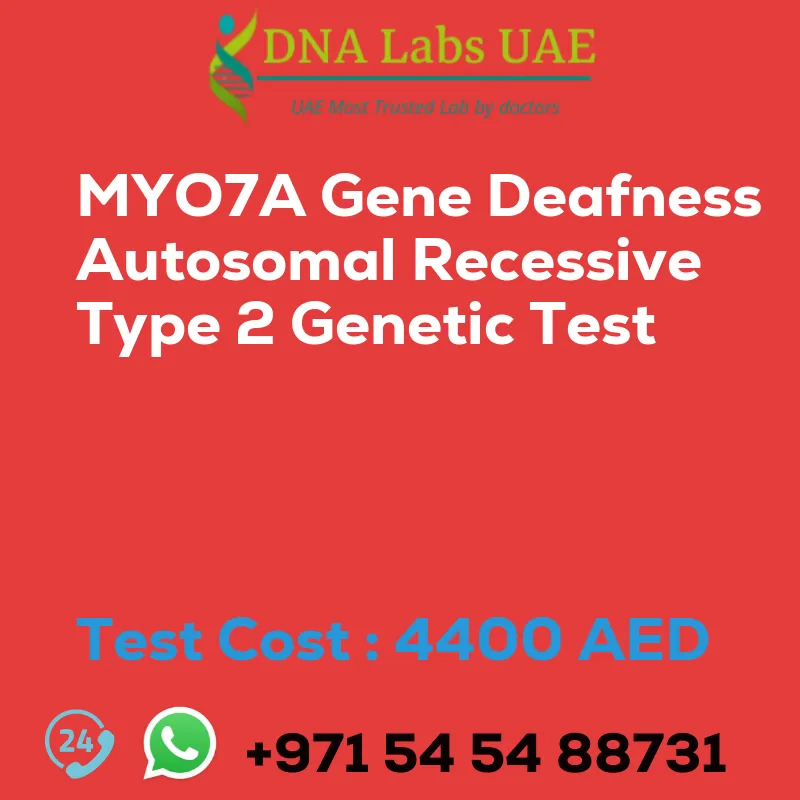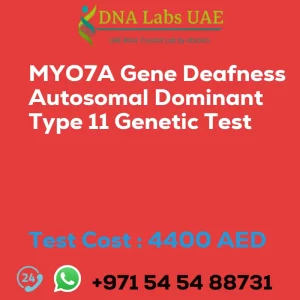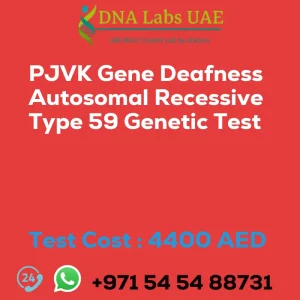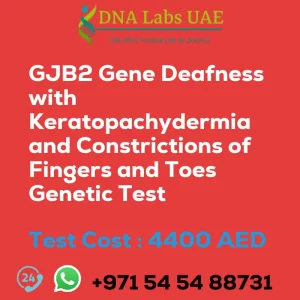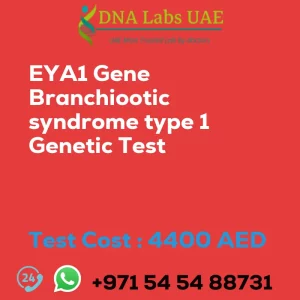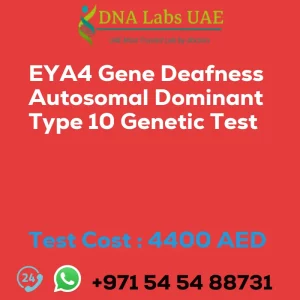MYO7A Gene Deafness Autosomal Recessive Type 2 Genetic Test
Test Name: MYO7A Gene Deafness Autosomal Recessive Type 2 Genetic Test
Components: Blood or Extracted DNA or One drop Blood on FTA Card
Price: 4400.0 AED
Report Delivery: 3 to 4 Weeks
Method: NGS Technology
Test Type: Ear Nose Throat Disorders
Doctor: ENT Doctor
Test Department: Genetics
Pre Test Information: Clinical History of Patient who is going for SLC52A2 Gene Brown-Vialetto-Van Laere syndrome type 2 NGS Genetic DNA Test. A Genetic Counselling session to draw a pedigree chart of family members affected with SLC52A2 Gene Brown-Vialetto-Van Laere syndrome type 2 NGS Genetic DNA Test gene SLC52A8
Test Details:
The MYO7A gene is responsible for producing a protein called myosin 7A, which is involved in the function of hair cells in the inner ear. Mutations in the MYO7A gene can lead to a condition known as deafness, autosomal recessive type 2 (DFNB2). DFNB2 is a form of genetic deafness that is inherited in an autosomal recessive manner, meaning that both copies of the MYO7A gene must have mutations in order for the individual to be affected. This condition is characterized by profound hearing loss from birth, with individuals typically having little to no residual hearing.
NGS (Next-Generation Sequencing) genetic testing is a type of genetic test that uses advanced sequencing technology to analyze multiple genes simultaneously. In the case of MYO7A gene deafness, NGS genetic testing can be used to identify mutations or variants in the MYO7A gene that may be responsible for the individual’s hearing loss. By identifying the specific genetic cause of deafness in an individual, NGS genetic testing can provide important information for diagnosis, prognosis, and potential treatment options. It can also help in genetic counseling and family planning by identifying individuals who may be carriers of the MYO7A gene mutation.
It’s important to note that genetic testing should be performed and interpreted by qualified healthcare professionals, such as geneticists or genetic counselors, who can provide appropriate guidance and support.
| Test Name | MYO7A Gene Deafness autosomal recessive type 2 Genetic Test |
|---|---|
| Components | |
| Price | 4400.0 AED |
| Sample Condition | Blood or Extracted DNA or One drop Blood on FTA Card |
| Report Delivery | 3 to 4 Weeks |
| Method | NGS Technology |
| Test type | Ear Nose Throat Disorders |
| Doctor | ENT Doctor |
| Test Department: | Genetics |
| Pre Test Information | Clinical History of Patient who is going for SLC52A2 Gene Brown-Vialetto-Van Laere syndrome type 2 NGS Genetic DNA Test. A Genetic Counselling session to draw a pedigree chart of family members affected with SLC52A2 Gene Brown-Vialetto-Van Laere syndrome type 2 NGS Genetic DNA Test gene SLC52A8 |
| Test Details |
The MYO7A gene is responsible for producing a protein called myosin 7A, which is involved in the function of hair cells in the inner ear. Mutations in the MYO7A gene can lead to a condition known as deafness, autosomal recessive type 2 (DFNB2). DFNB2 is a form of genetic deafness that is inherited in an autosomal recessive manner, meaning that both copies of the MYO7A gene must have mutations in order for the individual to be affected. This condition is characterized by profound hearing loss from birth, with individuals typically having little to no residual hearing. NGS (Next-Generation Sequencing) genetic testing is a type of genetic test that uses advanced sequencing technology to analyze multiple genes simultaneously. In the case of MYO7A gene deafness, NGS genetic testing can be used to identify mutations or variants in the MYO7A gene that may be responsible for the individual’s hearing loss. By identifying the specific genetic cause of deafness in an individual, NGS genetic testing can provide important information for diagnosis, prognosis, and potential treatment options. It can also help in genetic counseling and family planning by identifying individuals who may be carriers of the MYO7A gene mutation. It’s important to note that genetic testing should be performed and interpreted by qualified healthcare professionals, such as geneticists or genetic counselors, who can provide appropriate guidance and support. |

